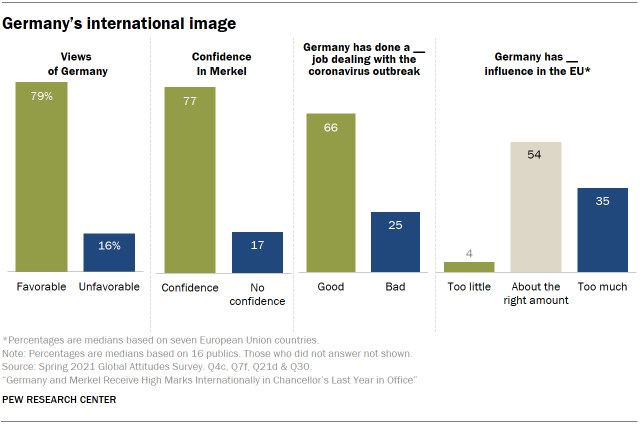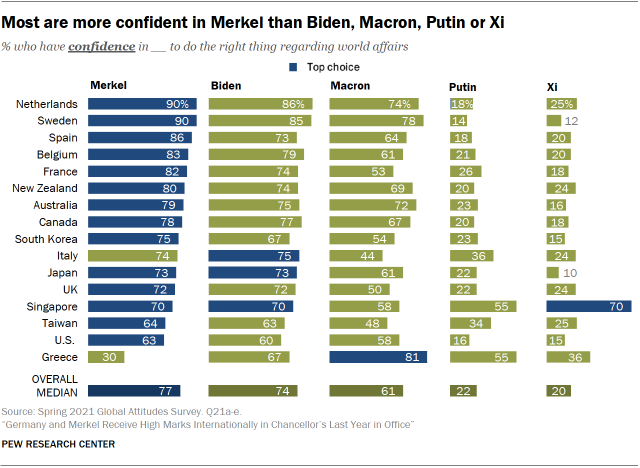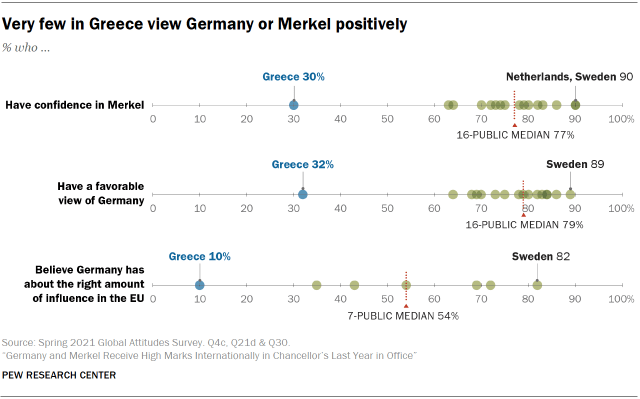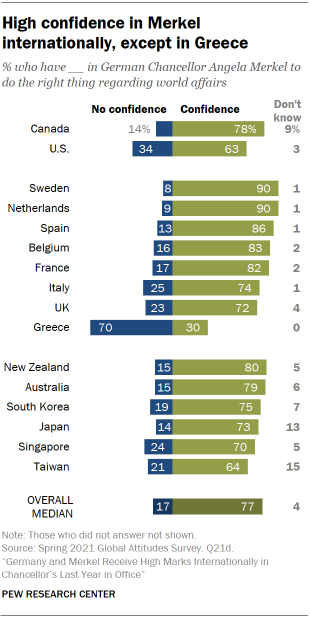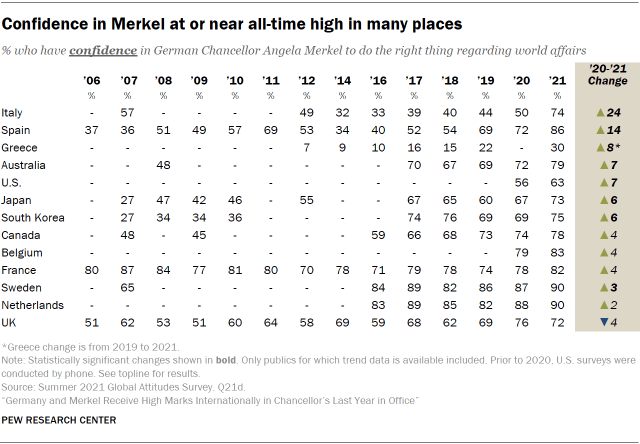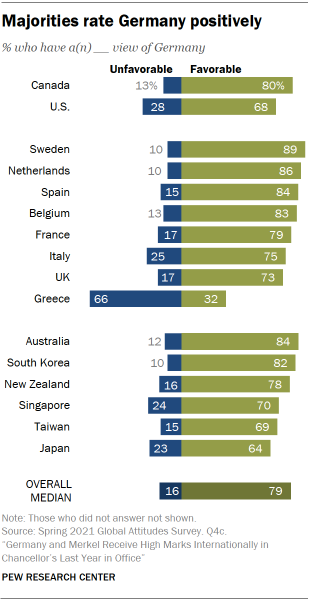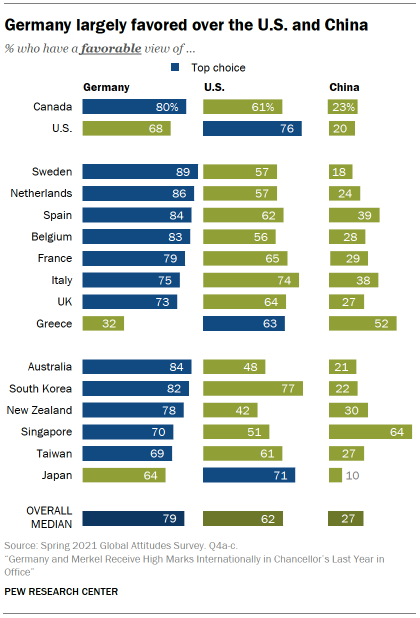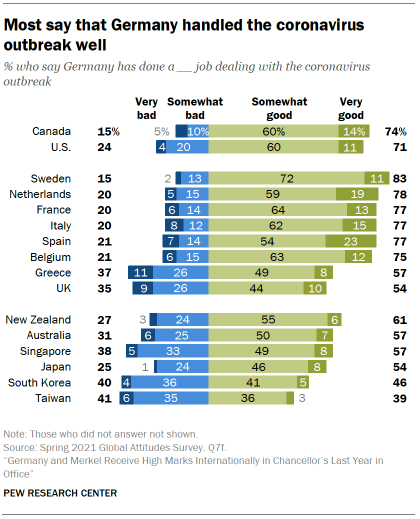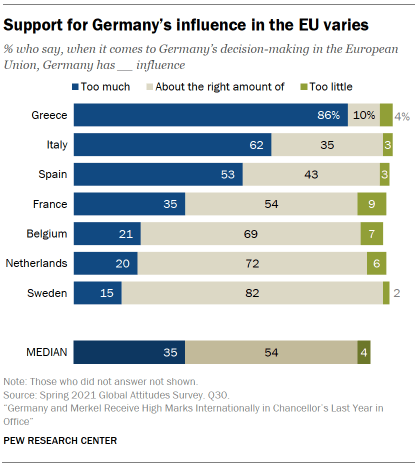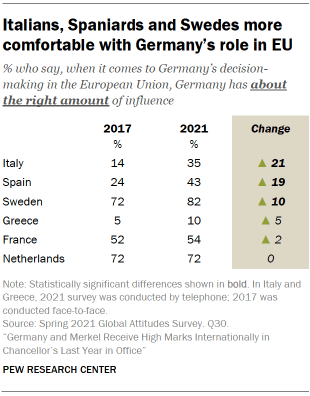Germany’s pandemic response and role in EU also rated positively
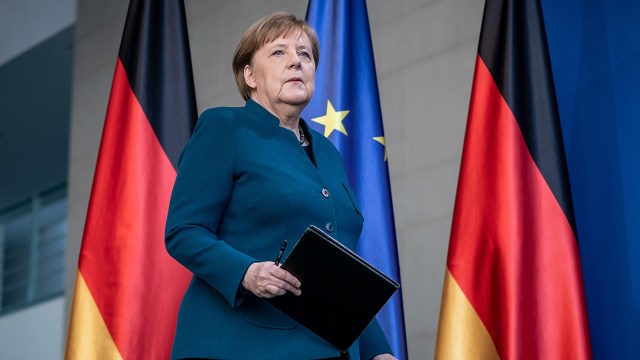
This Pew Research Center analysis focuses on public opinion of Germany and Chancellor Angela Merkel. For this report, we conducted nationally representative surveys of 15,227 adults from March 12 to May 26, 2021, in 15 advanced economies. All surveys were conducted over the phone with adults in Canada, Belgium, France, Greece, Italy, the Netherlands, Spain, Sweden, the United Kingdom, Australia, Japan, New Zealand, Singapore, South Korea and Taiwan. Data from Germany is not included in this report.
In the United States, we surveyed 2,596 U.S. adults from Feb. 1 to 7, 2021. Everyone who took part in the U.S. survey is a member of the Center’s American Trends Panel (ATP), an online survey panel that is recruited through national, random sampling of residential addresses. This way nearly all adults have a chance of selection. The survey is weighted to be representative of the U.S. adult population by gender, race, ethnicity, partisan affiliation, education and other categories.
This study was conducted in places where nationally representative telephone surveys are feasible. Due to the coronavirus outbreak, face-to-face interviewing is not currently possible in many parts of the world.
To account for the fact that some publics refer to the coronavirus differently, in South Korea, the survey asked about the “Corona19 outbreak.” In Japan, the survey asked about the “novel coronavirus outbreak.” In Greece, the survey asked about the “coronavirus pandemic.” In Australia, Canada, New Zealand and Taiwan, the survey asked about the “COVID-19 outbreak.” All other surveys used the term “coronavirus outbreak.”
Here are the questions used for the report, along with responses. See our methodology database for more information about the survey methods outside the U.S. For respondents in the U.S., read more about the ATP’s methodology.
Confidence in German Chancellor Angela Merkel among people around the world has remained relatively high throughout her nearly 16-year tenure. In her last year in office, as Germans prepare to vote for her replacement, a new Pew Research Center survey finds all-time high ratings of the German leader in most of the 16 advanced economies surveyed in North America, Europe and the Asia-Pacific region. Public opinion of Germany is also positive; most hold a favorable view of the country and say that it has done a good job dealing with the coronavirus outbreak. And among the European Union member states surveyed, many think Germany has about the right amount of influence in the EU.
Majorities in nearly every public surveyed have confidence in Merkel to do the right thing in world affairs, including nine-in-ten in the Netherlands and Sweden. Merkel has enjoyed generally high ratings in a number of countries since she first took office, with confidence growing as more people became familiar with her over time. In most places surveyed, trust in the German chancellor has never been higher.
Merkel currently enjoys the highest confidence ratings of the five world leaders asked about in the survey. She receives considerably higher marks than Russian President Vladimir Putin or Chinese President Xi Jinping, and Merkel also fares well compared with French President Emmanuel Macron and, in many places, U.S. President Joe Biden.
At the same time, people in Europe, North America and the Asia-Pacific region have very positive views of the country she leads. A median of 79% across 16 publics have a favorable opinion of Germany, while only 16% have an unfavorable one. Germany is also viewed more positively than the United States and China in most places surveyed.
In several of the European countries surveyed, views of Germany have not changed much over the past two decades, before Merkel took office. Roughly seven-in-ten or more have expressed a positive opinion of Germany in Sweden, the Netherlands, Spain, France and the United Kingdom in each year this question has been asked.
Favorable views of Germany and Merkel are influenced, in part, by perceptions of how Germany handled the coronavirus outbreak. A median of 66% say Germany did a good job dealing with the outbreak, and again, Germany fares well in comparison with other countries and institutions. Germany’s coronavirus response is generally viewed more positively than the responses of the World Health Organization, China, the EU or the U.S. And people who think Germany has handled the outbreak well are much more likely to have a favorable view of Germany and confidence in Merkel in every public surveyed.
Positive views of Germany and its leader extend to perceptions of its role in the EU, as well. A median of 54% across the seven EU member states surveyed think Germany has about the right amount of influence in the EU. A median of about a third say Germany has too much influence in the EU. However, perceptions of Germany’s international role vary considerably across the seven EU countries polled; while 82% of Swedes say Germany has about the right amount of influence, only 10% of Greeks agree.
On nearly every assessment, Greece stands out for its particularly negative views of both Germany and Merkel. Only around a third of Greeks have confidence in the German chancellor or a favorable view of Germany, though a majority give it good marks for its handling of the coronavirus outbreak (about the same share who say their own country handled the outbreak well). And compared with others in Europe, more people in Greece say Germany has too much influence in the EU (86%). Views of Germany have been negative in Greece since Pew Research Center started surveying there in 2012, just after Greece received a second bailout in response to the European debt crisis, while tensions between the two countries were high.
These are among the major findings from a Pew Research Center survey conducted among 17,823 respondents in 16 advanced economies – not including Germany – from Feb. 1 to May 26, 2021.
Most in Europe and the Asia-Pacific region are confident in Merkel
Across the 16 publics surveyed, a median of 77% have confidence in Merkel to do the right thing regarding world affairs. Majorities in every advanced economy surveyed except Greece hold this positive opinion of the German chancellor.
Merkel obtains both her highest and lowest ratings in Europe. Nine-in-ten in Sweden and the Netherlands have confidence in her to handle world affairs, including 48% and 60%, respectively, who have a lot of confidence. Confidence in the German chancellor is only slightly lower in Spain, Belgium and France.
On the other end of the spectrum, relatively few Greeks – only 30% – trust Merkel to do what is right. And Greeks are a clear outlier; the next smallest share is more than twice as high, with 63% in the U.S. having confidence in Merkel. Greeks view Merkel so negatively that just under half (45%) say they have no confidence in her at all when it comes to foreign affairs.
Fewer people in the Asia-Pacific region express an opinion about the German leader. At least 5% in each public provide a “don’t know” response, including 13% in Japan and 15% in Taiwan. But among those who do express an opinion, many say they have confidence in Merkel to do the right thing in world affairs. Positive assessments are particularly high in New Zealand and Australia, and at least seven-in-ten also have faith in Merkel in Singapore, Japan and South Korea.
Overall, confidence in Merkel has grown over the course of her nearly 16 years in office. Merkel’s confidence ratings are now at or near an all-time high in nearly every country where trends are available. And in roughly half of these countries, Merkel has seen at least a slight increase in trust since the previous year.
In Spain, for example, 86% now have confidence in Merkel when it comes to her handling of world affairs. This is a 14 percentage point increase from 2020 and a 49-point increase from 2006, her full first year in office. In part, this is due to a relatively large share of Spaniards who did not express an opinion in the first several years of her tenure, including roughly a quarter in 2006 and 2007. Similar patterns can be seen in Italy, Australia, Japan, South Korea, Canada, Sweden and the UK, where the share saying “don’t know” decreased and confidence increased as Merkel spent more time in office.
In the Netherlands, where opinions about Merkel have only been examined in more recent years, the share who have confidence in Merkel has never fallen below 82%. And in France, which the Center has surveyed annually since her first year in office, at least 70% have had trust in Merkel each year.
Although people in Greece have extremely low trust in Merkel compared with other surveyed publics, significantly higher shares say they trust the German leader now, compared with 2019 and earlier.
In addition to enjoying widespread confidence, and an increase in confidence from previous years, Merkel also fares well in comparison with other major world leaders. Compared with French President Emmanuel Macron, Russian President Vladimir Putin and Chinese President Xi Jinping, people are more likely to have confidence in Merkel in nearly every public surveyed. Faith in Merkel is also generally higher than trust in U.S. President Joe Biden, though views of the two leaders are similar in a number of places, including Canada, Italy, Japan, the UK, Singapore and Taiwan. Again, Greece is a stark exception, where Merkel is the least trusted of the five world leaders asked about.
In most publics, people with more education are more likely than their counterparts to have confidence in Merkel to do the right thing in world affairs. And in the U.S., Italy, the UK, Canada and Australia, people who place themselves on the left of the ideological spectrum have more faith in the German chancellor. For example, 79% of liberals in the U.S. trust Merkel compared with 48% of conservatives, a 31-point difference.
Views of Germany largely favorable
Across the 16 publics, a median of 79% say they have a favorable view of Germany. Except in Greece, where only about a third see Germany positively, this view is held by about two-thirds or more across every public surveyed.
Views are especially positive in Sweden and in the Netherlands, and more lukewarm in the U.S., where 28% express an unfavorable view –the highest of any public surveyed except Greece. Across the 16 publics surveyed, a median of only 16% have an unfavorable view of Germany.
Opinions of Germany have generally been positive and stable over the past two decades but have improved significantly among Italians (by 22 points) and Spaniards (8 points) since the question was last asked in 2019, prior to the outbreak of the coronavirus.
In most publics surveyed, those with more education, those with higher incomes and those on the political left are more likely to view Germany positively. And people who have unfavorable views of right-wing populist parties in Italy, the Netherlands and the UK are also more likely to have a favorable view of Germany.
Compared with the U.S. and China, Germany is held in high regard. Across all 16 publics surveyed, a median of 79% express a favorable view of Germany, while about six-in-ten rate the U.S. positively (62%). Only 27% view China favorably.
Of the three countries, Germany is viewed the most favorably in all but three of the publics polled. Only Americans, Greeks and Japanese rate the U.S. more positively than they do Germany.
Most rate Germany’s handling of the pandemic positively
Favorable opinions of Germany extend to views of its handling of the pandemic. A median of 66% say Germany has done a good job dealing with the coronavirus outbreak.
Again, overall assessments are most positive in Sweden and the Netherlands, though at least seven-in-ten in most of Europe, the U.S. and Canada agree. Despite generally negative opinions of Germany and its leader, a majority of Greeks think Germany has dealt with the outbreak well.
Views are somewhat less positive across the Asia-Pacific region, though people there are more likely than others to not provide an opinion on the topic. Still, more than half in New Zealand, Australia, Singapore and Japan say Germany has done a good job dealing with the outbreak.
Moreover, people in most places surveyed rate Germany’s handling of the pandemic more positively than that of the EU and WHO. And Germany’s response to the outbreak is rated much more highly than the responses from the U.S. and China. Greece and Singapore are the exceptions; in both countries, roughly three-quarters approve of China’s handling of the coronavirus, compared with 57% who rate Germany’s response positively.
In Europe, views of Germany’s coronavirus response are even more positive than people’s assessments of how their own country handled the outbreak. For example, while 77% of Spaniards say Germany dealt with the outbreak well, only 44% say the same about Spain.
In each of the 16 publics surveyed, those who say Germany handled the coronavirus outbreak well are more likely to have a favorable opinion of Germany and to have confidence in Merkel when it comes to world affairs. In the U.S., for example, 80% of people who think Germany has handled the outbreak well have a favorable view of Germany overall, compared with only 40% of those who do not think Germany has done a good job dealing with the coronavirus. There is a similarly large gap in confidence in Merkel between Americans who rate Germany’s response to the outbreak positively and those who rate it negatively (74% and 34%, respectively, have confidence in Merkel).
Many in EU say Germany has about the right amount of influence, though opinions vary
Across seven other EU member states surveyed, opinions about whether Germany has too much, too little or about the right amount of influence in decision-making in the EU vary. A median of 54% say Germany has about the right amount of influence, but roughly a third (35%) say the country has too much influence. Very few Europeans say that Germany has too little influence; the highest share of people saying this is among the French (9%).
More than half in France, Belgium, the Netherlands and Sweden say Germany has about the right level of influence in the EU.
Greece stands out again on this question with over eight-in-ten saying Germany has too much influence – the largest share among the EU member states surveyed. A majority of Italians also share this view, as do more than half of Spaniards.
While many in Italy and Spain say that Germany has too much influence, the percentage in these countries who say Germany has about the right amount has increased by about 20 points since the question was last asked. Compared with 2017, more Swedes now also say Germany has about the right level of influence.
In most of the seven EU countries surveyed, there are no significant differences on Germany’s perceived influence when it comes to education and gender. In Greece, those ages 65 and older are more likely to say Germany has too much influence (89%) than those 18 to 29 (72%). Greater shares of older Italians, Belgians and the French are also more likely than their younger counterparts to say this.
